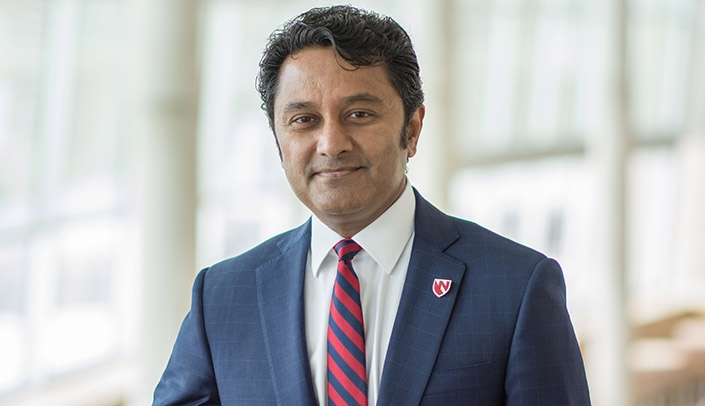In December 2019, the Global Forum for Cancer Surgeons® (GFCS) sent a statement of support to the Brazilian Society of Surgical Oncology (BSSO) for a surgical treatment option for certain types of cancers. The statement was signed by the GFCS® director, Chandra Are, MD — who also is the Jerald L & Carolynn J Varner Professor of Surgical Oncology and Global Health at UNMC.
The BSSO used this statement along with others to lobby Brazil’s National Committee for Health Technology Incorporation (CONITEC). CONITEC is the official agency responsible for incorporating or disinvestment of health technologies into the Brazilian Public Health Care System (Sistema Único de Saúde-SUS). As a result of these efforts, the treatment — cytoreductive surgery and hyperthermic interperitoneal chemotherapy (CRS-HIPEC) — is now included in the list of procedures reimbursed by the Brazilian Public Health Care System for treatment of certain types of cancers in Brazil.
The Global Forum of Cancer Surgeons® was Dr. Are’s brainchild and was formed under the auspices of the Society of Surgical Oncology, the largest single-country surgical oncology society in the world. The mission of the GFCS is to promote surgical care for cancer patients through a multi-disciplinary approach for patients here and across the world, as it did in Brazil.
 |
| Members of the Global Forum of Cancer Surgeons at a 2019 meeting. |
“On the global stage, there really was not a cohesive voice around all the surgical issues related to cancer care,” said Eileen Widmer, CEO of the Society of Surgical Oncology. “So the society began, about six or seven years ago, to organize relationships with the leading surgical oncology organizations on each continent – to cultivate a global community of surgical oncology.
“Dr. Are was instrumental in working with our leadership in pulling this together,” she said. “This was his vision for a way to bring the global surgical oncology community together to begin to position itself as a voice on the global stage about these different issues.”
The Brazil decision was an example, Dr. Are said, of how “we sitting here in Nebraska through organizations such as GFCS® are shaping cancer surgical care here and across the world.”
The GFCS® was formed in 2017 and now consists of the 15 leading surgical oncology societies from across the world. They include the surgical oncology societies from America, Brazil, Canada, Chile, China, Egypt, Europe, India, Israel, Italy, Japan, Korea, Latin America, Pakistan and Mexico. Dr. Are serves as the founding director of the GFCS®. The forum advocates “not just in clinical care, but in education, in research — anything that affects surgical care for cancer patients,” Dr. Are said.
“Surgical interventions for cancer are being underused globally and can often be neglected for various reasons,” he said. “Surgery is an essential component of cancer care, but it is not available to everyone.”
The seminal Lancet Oncology Commission publication in 2015 noted that although 45 million surgical procedures will be needed for cancer patients worldwide, only 25% of them will get safe, affordable and timely surgery. Unfortunately, majority of the patients that do not have access to cancer surgery reside in the low to middle-income countries. At the same time, there are inequities in surgical care for cancer patients in high-income countries as well.
This disparity in the underutilization of surgery for cancer care worldwide was the impetus for forming the GFCS®, with a vision of surgical oncology leaders from across the world speaking as one to address these disparities.
The GFCS is currently working on developing overarching principles/guidelines for addressing cancer surgery during any global calamities such as the current COVID-19 pandemic.
“The voice of the GFCS® can be very powerful as leaders from these 15 surgical oncology societies represent nearly 75%-80% of the global cancer burden by incidence and mortality,” Dr. Are said.
The success in Brazil is a prime example of the influence and capabilities of the GFCS®.
Dr. Are highlighted the fact that we at UNMC lead in promoting cancer care not only here in Nebraska, but across the world. And through efforts of organizations such as the Global Forum of Cancer Surgeons®, we are altering the cancer care landscape and improving cancer care.”

Thank you, Dr. Are, for your visionary leadership in this critically important field.
Amazing work, Dr. Are – thank you for all that you do, both locally and globally!